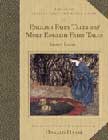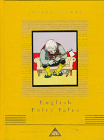| Introduction | Annotated Tales | eBooks | Bookstore | Illustration Gallery | Discussion Board | Blog |
 |
|
|
Alphabet-Rhymes Return to Popular Rhymes and Nursery Tales by James Orchard Halliwell AMONGST the various devices to establish a royal road to infantine learning, none are more ancient or useful than the rhymes which serve to impress the letters of the alphabet upon the attention and memory of children. As early as the fifteenth century, "Mayster Benet," who was rector of Sandon, in Essex, in 1440, and afterwards a prebend of St. Paul's, composed or translated an alphabet-rhyme, which not only professed to recall the memory of the letters, but at a time when the benefit of clergy was in vogue, held out the inducement of providing means for avoiding the punishment of death. The following copy is taken from two versions in MS. Harl. 541, compared with each other:
" A. APPLE-PIE Eachard, a learned clergyman of the Church of England, published a work in 1671, [1] in which he condescends to illustrate his argument by a reference to this celebrated history. Talking of the various modes of preaching adopted by different sects, he proceeds in this manner: "And whereas it has been observed that some of our clergie are sometimes over nice in taking notice of meer words that they find in texts, so these are so accurate as to go to the very letters. As suppose, sir, you are to give an exhortation to repentance upon that of St. Matthew, 'Repent ye, for the kingdom of Heaven is at hand:' you must observe that Repent is a rich word, wherein every letter exhorts us to our duty, — Repent, R. readily, E. earnestly, P. presently, E. effectually, N. nationally, T. thoroughly. Again, Repent Roaringly, Eagerly, Plentifully, Heavily (because of h), Notably, Terribly. And why not, Repent Rarely, Evenly, Prettily, Elegantly, Neatly, Tightly? And also, why not, A apple-pasty, B bak'd it, C cut it, D divided it, E eat it, F fought for it, G got it, &c. I had not time, sir, to look any further into their way of preaching; but if I had, I am sure I should have found that they have no reason to despise our church upon that account." The worthy divine would have censured the sermon on Malt attributed to the elder Dodd.
Then follows a woodcut of the pie, surrounded by a square of the letters, though it is not very easy to perceive how the conditions of the problem are to be fulfilled. The remainder of the book, a small 32mo., is occupied with "A Curious Discourse that passed between the twenty-five letters at dinner-time,"—
The manner in which a practical moral good was to be inferred from this doggerel is not very apparent, but Mr. Marshall had a way of his own in settling the difficulty. The finale must not be omitted: "Having concluded their discourse and dinner together, I have nothing more to add, but that, if my little readers are pleased with what they have found in this book, they have nothing to do but to run to Mr. Marshall's at No. 4, in Aldermary Churchyard, where they may have several books, not less entertaining than this, of the same size and price. But that you may not think I leave you too abruptly, I here present you with the picture of the old woman who made the apple-pye you have been reading about. She has several more in her basket, and she promises, if you are good children, you shall never go supperless to bed while she has one left. But as good people always ask a blessing of God before meals, therefore, as a token that you are good, and deserve a pye, you must learn the two following graces, the one to be said before the meals, the other after; and the Lord's prayer every night and morning."
NOTES 1: Observations, &c., 8vo. Lond. 1671, p. 160. 2: Some copies say "H. halv'd it, I. ey'd it," and afterwards, "U. hew'd it, .. X. crossed it, Y. yearn'd for it, and Z. put it in his pocket, and said, Well done!" Halliwell, James Orchard. Popular Rhymes and Nursery Tales. London: John Russell Smith, 1849. Return to Popular Rhymes and Nursery Tales by James Orchard Halliwell |
|
||||||||||||
| ©Heidi
Anne Heiner, SurLaLune Fairy Tales E-mail: heidi@surlalunefairytales.com Page created 10/25/07; Last updated 10/25/07 www.surlalunefairytales.com |













